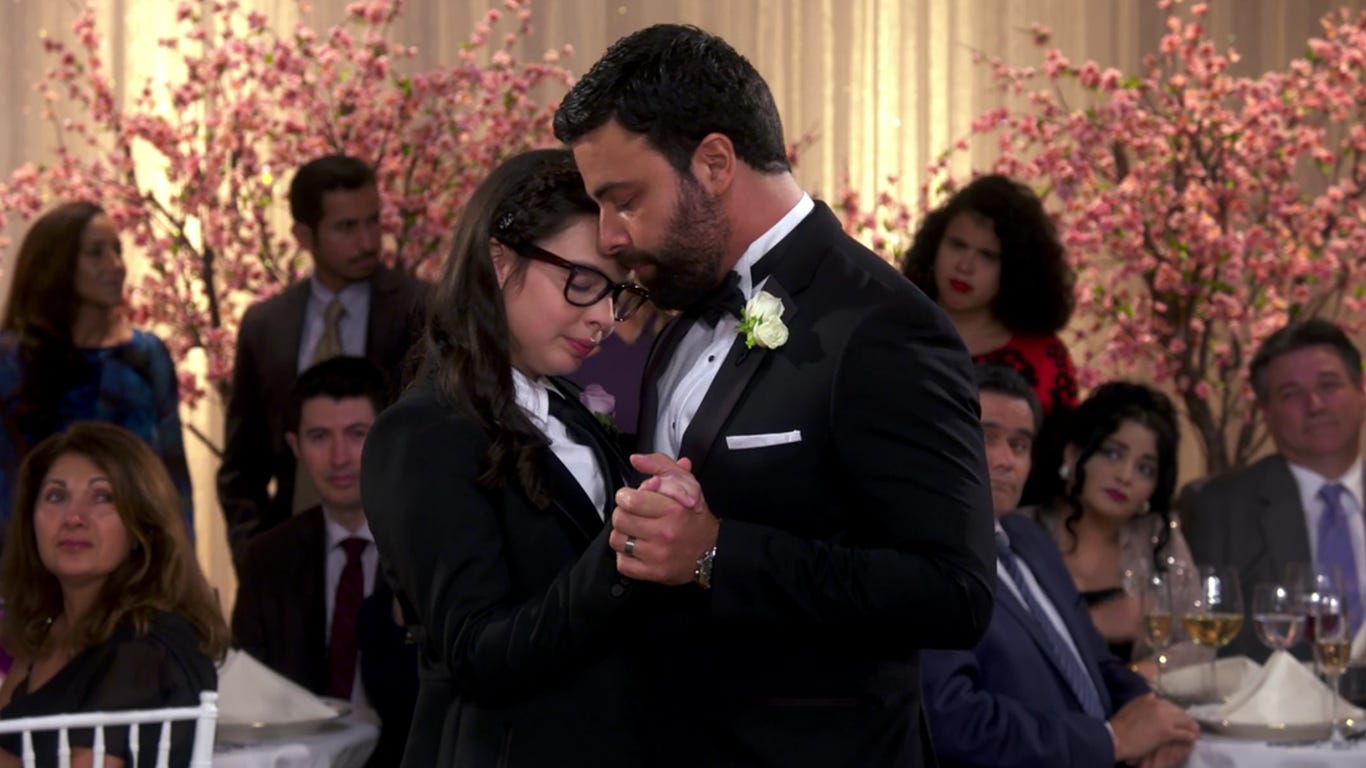
Sex Education and One Day at a Time Are Helping Immigrants and Their Queer Kids Bridge the Generational Gap
These inquisitive Netflix shows provide positive blueprints on how TV can handle coming out stories with empathy

Ask any child of immigrants and they'll tell you their parents came to this country with a few small bills in their wallets. Just how small is based on who's telling the story: My dad likes to say $7 solely for the fact that it's a prime number which is poetic to his scientific mind. But whatever the amount, it was not large enough -- not for my father, let alone immigrants who came before him -- to feel like they had finally made it to safe harbor. The very second immigrants step onto foreign soil, a more dangerous journey immediately begins. These new countrymen eat, sleep, go to work, and raise families but in a manner so alien you begin to doubt your foundational understanding of yourself, your world and your place within it. From simple changes like adapting to eating with cutlery so your coworkers don't assume you're uneducated to complex issues like shrouding the ways you worship in secrecy, every single social interaction is weighed on a scale set by people who don't know or understand you. And historically speaking, the people who set the scale are often looking for a reason to measure immigrants and find them unworthy.
Even with a guarantee of a Hollywood happy ending, which is the exception and not the rule for immigrant narratives, that's an incredible difficult and dangerous atmosphere in which to raise a family. Each child speaks and acts in ways unintelligible to their parents without a common frame of cultural reference; each child thinks the scale they are measured on is weighted to slide in their favor because this foreign country isn't at all foreign to them. And that's true for most children, they'll go through a schooling system and experience rights of passage that unshakably ties their world views to their parents' adopted countries making it easier to demand equal respect and rights. But to an immigrant parent, each time a child strikes out in a way that could cause the scale to tip against them, the consequences are calculated at an exponentially higher cost. A fight at recess compounded with xenophobia and racism could suddenly mean deportation instead of detention. With the stakes so high, it's understandable why many immigrant parents push their kids into emulating a model minority, a good immigrant. If there are only good things to pay attention to, fewer bad things have a chance of happening. Don't give them a reason to look closer, to figure out flaws, to attack: It's flawed logic, but one that generations of immigrants have clung to in the past, and will cling to in the future.
Let's Talk About TV's Evolving, Complicated Relationship With Sex
Millions of immigrant families have been ripped apart because of this insidious seed of fear, particularly if their kids are queer. Their kids are claiming an identity that makes them more susceptible to physical violence, could potentially prevent them from having successful careers, and isolates them from whatever community structures the generations that came before managed to build in an inhospitable land. While fear makes people react in wild and uncertain ways, a major part of the problem is there's little to no blueprints to navigating major upheavals. Where a child sees the freedom to be themselves and find true happiness with a partner, a parent sees only what society could and will inflict.
Enter shows like One Day at a Timeand Sex Education, which are finally giving immigrant parents a cultural frame of reference on how to deal with their children when they come out.
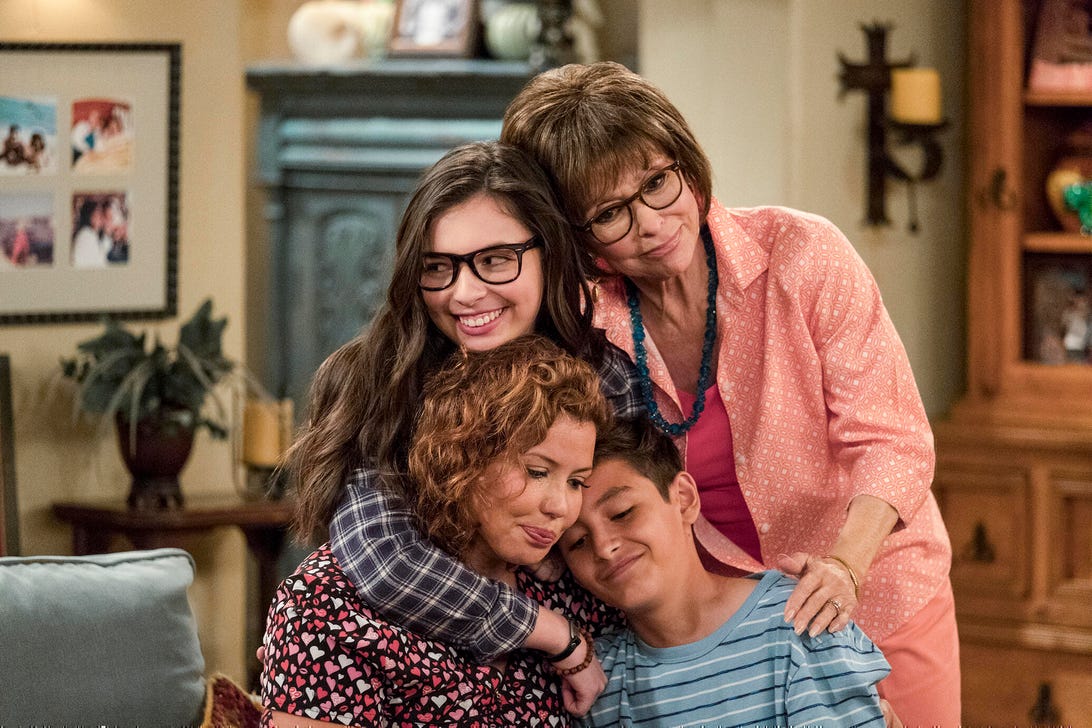
The Alvarez family, One Day At A Time
Adam Rose/NetflixBoth shows are Netflix darlings that deal heavily in teenage coming-of-age stories but are drastically different otherwise. One Day at a Time is a focused meditation on how one multigenerational Cuban-American family defines love and familial relationships. Sex Education is British teen dramedy in which high schoolers of all different ethnicities, sexualities, religious, and socio-economic backgrounds are connected through their inability to understand relationships or sex. Both feature extremely moving coming out storylines but with wildly disparate levels of risk, communication, and timelines of acceptance.
In One Day at a Time, Elena Alvarez (Isabella Gomez) is a typical teenage girl who grew up immersed in internet culture. She cares, sometimes a touch too much, about every injustice that she stumbles across in her journey to adulthood. Vocal, passionate and determined, Elena wants to leave the world a better place than when she found it. The fact that she's a second generation Cuban-American who struggles with Spanish despite living with her (formerly) undocumented Cuban grandmother simply means that while she doesn't personally understand the full breadth of cruelty in the world, she is very aware and empathetic to those who aren't afforded the privileges she's been given.
And she is privileged: She's the one member of her family who is white-passing, she's extremely smart and is college-bound, and despite being from a lower-middle class family, she knows she's surrounded by adults who will do anything to make her future happen despite the cost. All in all (even with the back talk and occasional lying factored in) Elena is a stellar kid, a platonic ideal of what immigrant parents hope for when they give up everything for their kids to have better lives. Until she tells her family she prefers women.
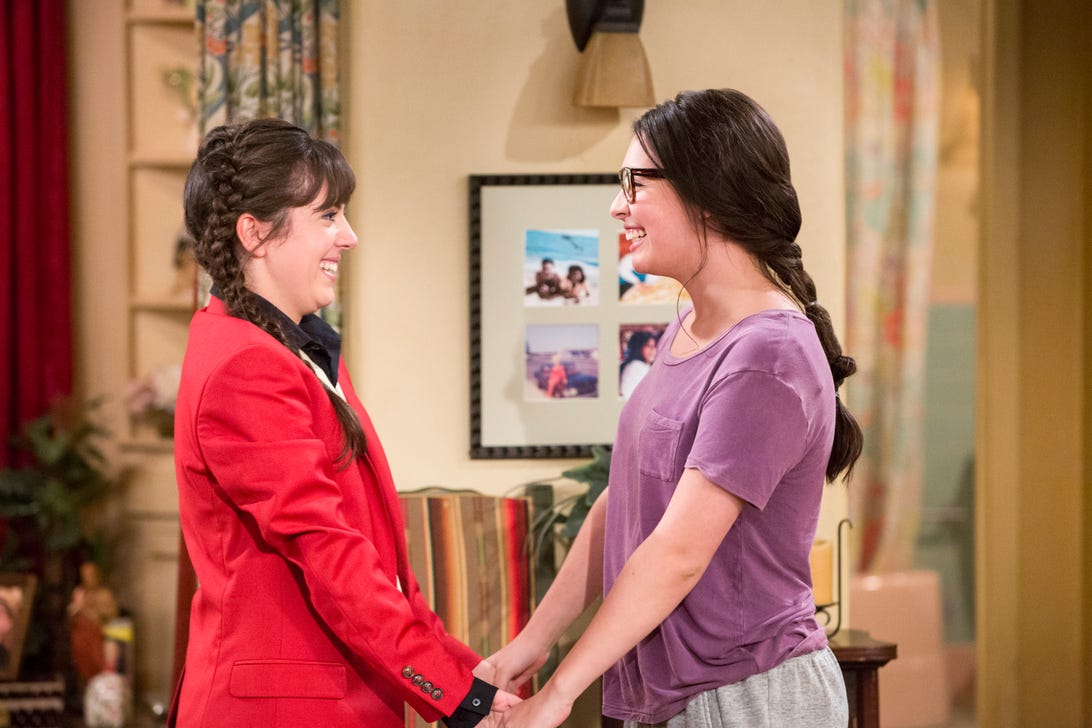
Elena and her significant other, Syd, One Day At A Time
Mike Yarish/NetflixOf her family, her Catholic grandmother Lydia (Rita Moreno) accepts the fact with the least fuss. In about 10 seconds she's squared away her love of her granddaughter with the overwhelming presence of religion in her life. (The whole conversation would have taken five seconds if Lydia hadn't paused to consider what the Pope might think.) In the end though, "God doesn't make mistakes" and the Pope said, "Who am I to judge," which Lydia takes as a blessing to continue loving her granddaughter unconditionally. It's ironically Elena's more liberal (and first gen) parents who struggle with this change.
While Penelope (Justina Machado), Elena's mother, initially finds it difficult to let go of all the future bonding moments she had anticipated- - talking about boys, supporting Elena through a pregnancy scare and celebrating the negative result with a sushi dinner -- there was never any real consideration of not fully supporting her daughter. But Elena's father, Victor (James Martinez), serves up the exact betrayal that keeps many immigrant kids in the closet, at least to their families, long after they become adults. He walks out of her quinceañera, abandoning his child at a time when she's supposed to become a woman because he can't stand the public spectacle of his daughter wearing a suit to her own party. It's Penelope -- and eventually the whole family -- who steps in for the traditional father-daughter dance. Elena suffers an immense heartbreak, and while she knows she has people in her corner, it takes another two seasons for her to even begin to try and forgive her father.
Starz's Vida Is Plenty Sexy -- But Every Graphic Moment Counts
On Sex Education, Eric (Ncuti Gatwa) is that kid you knew in high school who never really had to come out at all. Unlike Elena, who has to establish her queerness in most social settings, Eric's force of personality takes care of it for him. A mere glance, a moment in his presence indicates all the different ways this sweet, often generous kid is othered: he's an immigrant (Ghanaian-Nigerian and also very firmly British), he's black, and he's gay. Everyone knows exactly who he is in their small town (that only has one other openly gay male teen), and acknowledges it with one crucial exception.
In his own family, Eric is a constant source of worry. Because he's both the youngest and the only boy in the family, his father (DeObia Oparei) continually urges him to hide who he is. Caught midst makeover with a school friend, his father reminds him to take all that mess off before his mother sees him. Eric is warned that other men, even queer ones, might not take kindly to men who don't look and act like traditional men. His father advises Eric to toughen up, be less flamboyant if he's going to live like this.
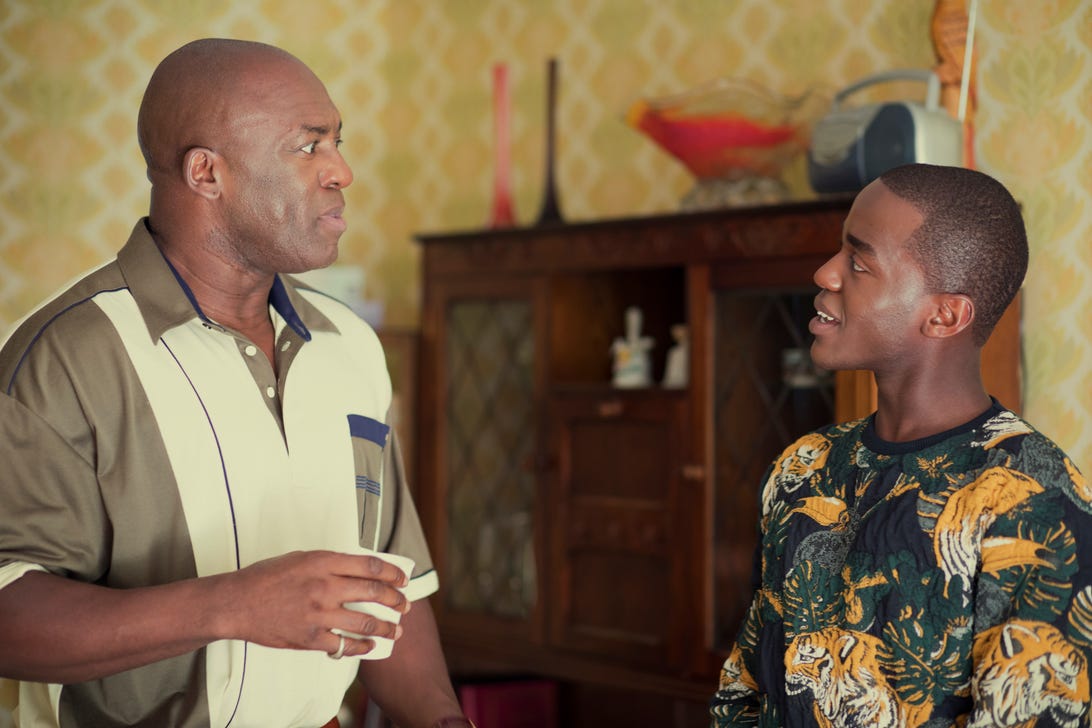
Eric and his father, Sex Education
Sam Taylor/NetflixUnlike One Day at a Time, where Victor's fears are mostly unfounded, Eric's father in Sex Education turns out to be right. In drag for Eric and Otis' (Asa Butterfield) annual birthday trip to see Hedwig and the Angry Inch, Eric ends up stranded, robbed, and with no way to get home other than walk. Creeping down a darkened road late at night dressed in a short skirt and a perfect contour, Eric comes face to face with how people who don't know him and haven't grown up with him treat him in the face of what his personality automatically presents. And it's ugly. After being cat-called and sexual harassed, Eric is caught in every parent's nightmare. Physically beaten and bruised because of a little makeup and a good wig, Eric finally understands what his father had been trying to tell him. Intellectually, Eric had known that not everyone would be as at ease with him as his own community, but to come face-to-face with this kind of violence changed Eric.
Sporting dull, norm-core outfits at school is only the first step; Eric pushes who he really is further and further down until it explodes in another violent altercation. Repeating a pattern of violence that was inflicted on him is what finally catches his father's attention. He may now have the straight-passing son he wanted, but he hates the callous, cold, and ugly person that turned out to be. Eric's father finally recognizes the truth that his specific fear of being a bad immigrant has corrupted his brave, beautiful son.
On both One Day at a Time and Sex Education, queer teens are burdened, trapped, and hurt when they simply try to live honestly as who they are. Their immigrant families are the ones who hurt them most, even if that hurt comes from a well-intentioned place like trying to protect their kids. That's a tale as old as time, but One Day at a Time and Sex Education do far more than simply show immigrant families how deeply we can betray each other to feel a little safer in our adopted countries. They both take the steps to show us how to overcome that fear which tears us apart.
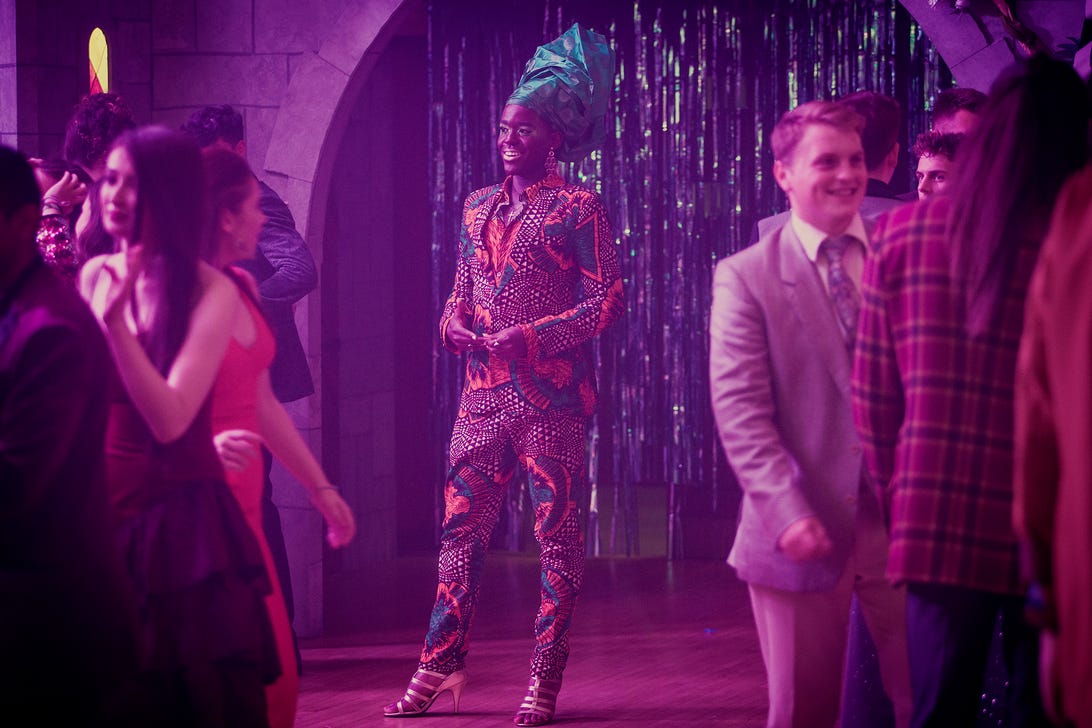
Eric at the prom, Sex Education
Jon Hall/NetflixSex Education gives queer kids the ultimate cathartic fantasy disguised as bingeable TV. Eric's father not only encourages him to shed his angry, violent, butch persona when he sees the kind of man it's turning him into (a bad one), but also drives Eric's highlighter-popping, gele-wearing, kitten-heeled prowling ass to prom in support. The conversation they have on the steps of the high school is one ripped straight from the fantasies of queer immigrant kids everywhere: it's a direct apology. Eric's father admits that his own fears and misgivings drove him, and after seeing who his son was after taking his advice, he's immensely proud and grateful to have a son who is braver than him. In that moment of rare and real honesty, Eric respects his father and his father respects him.
One Day at a Time doesn't wrap up Elena's queerness and her father's issues quite so neatly. She falls back on the main support system of her mother, brother, and grandmother who despite individual misgivings would never abandon Elena to face the world on her own. But two seasons later, her father seems to be able to get everything else in his life on track -- alcoholism defeated, PTSD managed, a new wife to start a do-over family with -- except for his understanding of Elena's queerness. It's over the slow, painful, and season-long negotiations for Elena's attendance and participation in Victor's wedding that they finally have a chance to heal their relationship in the Season 3 finale.
The Best Relationships on Game of Thrones Don't Involve Sex
Acting as Victor's best man, Elena wears a suit similar to the one that caused him to storm out of her quinces. She gives a perfect toast that only gives immense credit to her father at the reception, despite the fact that the last time she needed him, he walked out on her. Elena breaks down later on that night to her brother because while the joy she gets from seeing her father significantly happier and healthier is sincere, so is all the anger in her heart. It's not easy for Elena just to forget every time Victor cared more for other people's opinions of her and how she reflects on the family than her own happiness. When Elena walks back into the reception after swallowing her tears, Victor makes it clear that he can't forget either. Through tears and in front of their family, their friends, and God, Victor admits he's got a long way to go before he earns Elena's forgiveness but he might as well start with a dance. As they finally share the dance they were meant to have at Elena's quinces, there's that same glimmer of respect that Eric shares with his father.
That respect, that understanding can only happen under one condition: When immigrant parents can admit that their legitimate and understandable fears are just that, a nightmarish twist of imagination that may or may not come true. Their children will get hurt, will suffer because they are not like the people of their adoptive countries, and will be painting another target on their backs with their queerness. But One Day at a Time and Sex Education are reminding immigrant parents that they don't have to be the ones to inflict that pain.
And even if they already have, it's not too late to show their children some empathy. It can be as simple as "I was wrong." It can be as complex as taking three years to slowly learn about the queer community and showing up at Pride shirtless with a glitter gun. Either way, it starts with recognizing that automatically fearing the unknown is dangerous, and perhaps those brilliant and brave children have just as many lessons to teach their parents as their parents have to their kids.
The very first of which is, in Eric's own words, "Look, I'll be hurt either way, isn't it better to be who I am?"
This week, TV Guide is exploring television's relationship with sex, puberty, and everything in between. As part of Sex Ed Week, we're examining how Vida embraces sex as a form of storytelling, why Game of Thrones' best relationships don't involve sex, how TV continues to fail viewers when it comes to adult virginity, and more. You can check out all our Sex Ed Week content here.
